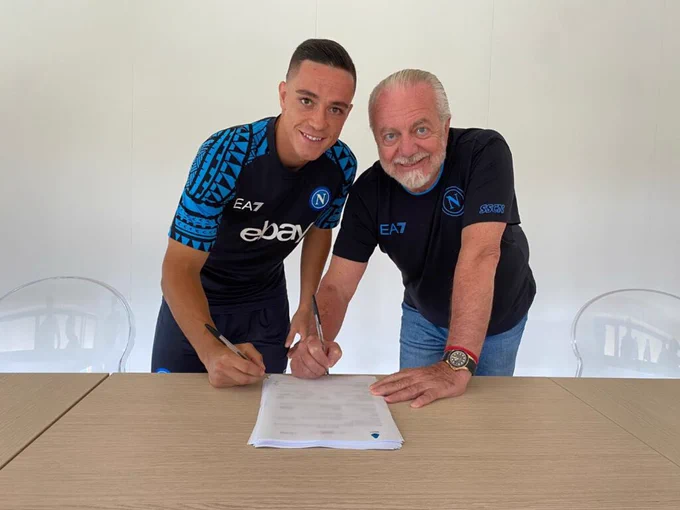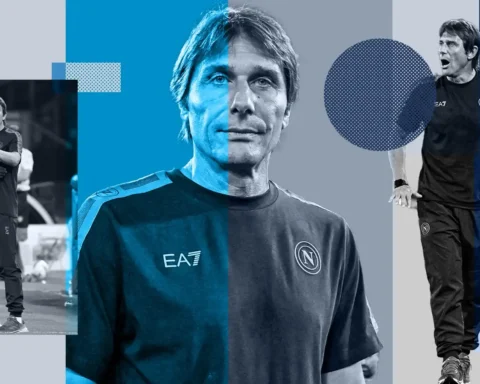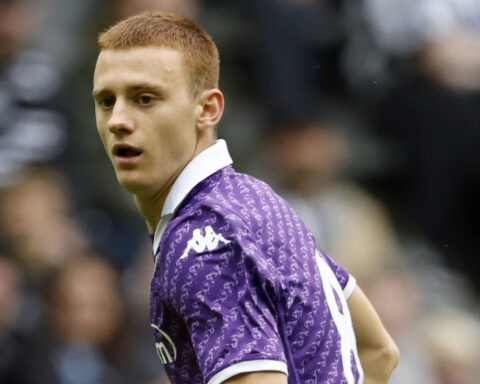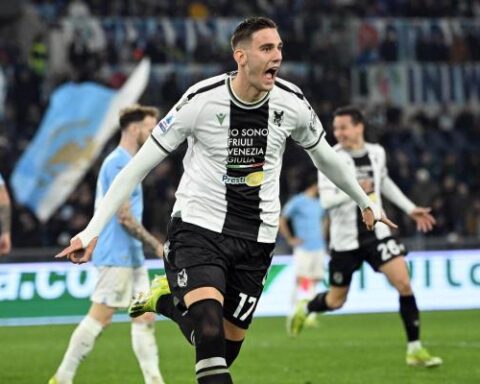Napoli forward Gicomo Raspadori explained the important role that Roberto De Zerbi played in his career: “If I hadn’t met someone like him, my destiny might have been different.” The young talent gave a lengthy interview to La Gazzetta dello Sport about his career to date, explaining the importance of studying while playing and the players who have influenced his career:
You are at university and you score goals: they are not incompatible, then…
‘More and more of us, fortunately, are studying and playing. I’m trying to get a degree in motor science. Others, such as Pessina, Pobega, Buongiorno and before them Chiellini, have shown that it is not impossible to combine sport at the highest level with one’s education. I would like to fight stereotypes about footballers: people without curiosity, who only think about the ball and money, without relevant human qualities. It’s not like that, believe me. I’m a practical person, very focused on the day-to-day, I don’t make Pindaric flights. But I would like to prove, in the future, that football players can make a living by cultivating the game and knowledge, books and corners.
What was your room like as a child?
“There was a bunk bed, where my brother and I slept. He was always a stimulus to me. A lot of balls were scattered in that little room. But above all, in our conversations with the door closed, there was a lot of energy, dreams, a desire to live and to build our future. On the table were stickers, in the bookcase many volumes. Our mother educated us in the beauty of reading. I remember that she started reading to us the saga dedicated to football by Luigi Garlando’.
How did you start playing?
“In the street, like everyone else. In the square of my village, Castel Maggiore, until late at night. Then in an amateur club with a nice name ‘Progresso calcio’. A serious club where technique and values are taught together. At the age of eleven, with a phone call to my parents, I was transferred to Sassuolo, where I got on very well. I remember the first day. The coach, Papalato, didn’t know anyone: he placed what are called ‘the chinesini’, i.e. plastic cones, to indicate the expected roles and told us to choose ours. I had always played in midfield and I took that one. He watched me play and then told me that my place was that of centre forward’.
Does it weigh on you, in this physical football, to be so small?
“Honestly, no: it always pushed me to try to evolve. If I didn’t have the physical structure of others, then I had to be better and better, both tactically and technically. Having realised this early on led me to work on it immediately. I know that, to stay at a certain level, there are also physical standards to be met. The beauty of football also allows you to be mischievous in certain things, to fill out centimetres or muscles’.
What is the national team for you?
“Just talking about it gets you excited. Being a part of it transfers a crazy energy to you. You know that you are representing your country, thousands of children who had or have the same dream as you and who will not be able to realise it. You are wearing blue for them too. My first memory of that jersey is the 2006 World Cup. I was six years old and I think it is, in absolute and general terms, the first moment in my memory’.
What were the European Championships for you? You were 20 years old or thereabouts.
“The realisation of where I had arrived, with so much effort and so much passion. At the first call up, I tiptoed into a fantastic group and we won. And then, being there, I realised that nothing is impossible, I realised that the work, the days in the rain or in the wind, training, all helped to reach such a high peak. It was an emotion that I would like to relive soon”.
The same thing happened to you with Napoli. Do you, with this kind and balanced image, actually have a winning temperament?
“I hope to be experienced, also by my teammates, as a silent leader. I believe I bring positivity, that I can create energy. At just over 20 years old, the Sassuolo ‘senators’ and coach De Zerbi gave me the captain’s armband. Perhaps because I unite, not divide. I try to make a team, I don’t sail alone’.
Is there anything you don’t like, in the great circus of modern football?
“The media aspects, which can lead to instability in guys like us. In football you reach everything very quickly and if you are not lucky enough to have people around you who keep you connected to reality, who help you not to forget where you come from, the risk of getting lost is very high. You go from being unrecognised to having fame and being in the media, suddenly you have a lot of money to spend: if not managed, all this can lead boys into difficult situations.
Can you tell me about your first impact with Naples?
‘Right from the start being here was a source of pride. I had been sought after by Juve, Milan, Inter, but I am happy to play in Napoli, also because of the history of the players, I would like to remember only Maradona and Juliano, who wore this jersey. I am ambitious and I knew this was the right place: after the wonderful time spent at Sassuolo, I needed to get out of my comfort zone, to fight for a Scudetto and in international cups. At the beginning it was strange, but here there is energy, there is joy of life and you can feel a passion for football that is feverish and true, collective, daily love. I am happy here.
The Scudetto?
“The Scudetto was in the air, that energy was propelling us. The city was buzzing, and we with it. It was a victory for the team, the coach, the club. But also of the whole city: you could feel a common desire, an expectation experienced in every house that then became collective joy’.
This year, however, what’s wrong?
“I don’t think there is anything particular. I think it’s physiological, after winning the Scudetto. It’s not an alibi, but last year was emotionally draining, we’re not used to winning, we don’t always have the nastiness that comes from that conviction. We have to find it again, we’re working on it. We are a great team. We cannot and must never forget that.
Who has been the most important coach in your life?
“I’ve been very lucky, I’ve always found high-level coaches, also from a human point of view. If I have to name one, I can only remember Roberto De Zerbi. He made my debut in A and has always shown me unconditional trust. At one point it was thought it was right for me to go on loan to Serie B. He opposed it, he always wanted me at the centre of his plans. With De Zerbi I realised my possibilities. If I hadn’t met someone like him, my destiny might have been different.
Which player were you inspired by?
“Aguero. Both for his physical characteristics and his way of being on the pitch. Then Di Natale, Rooney, Tevez”.
Is there a day in your career that you would like to relive and one that, if you could, you would erase?
“Yes. And they are the same day. That of the national team’s failure to qualify for the World Cup. I would like not to relive that pain. And, at the same time, I wish it would return so that I could change it. I don’t forget the terrible silence in the locker room after the game. Not having given millions the joy of enjoying the World Cup was a devastating disappointment that left us feeling guilty. One has to learn, even from defeats. You don’t always win, neither in sport nor in life. But we are a strong and cohesive group, with a great coach, we will make up for it.
Can talent be educated, refined?
‘Yes, it is educated. Of course, there has to be a basis, an inspiration. But I belong to the philosophical current, in football, of those who think that talent is little if it is not accompanied by hard work. The greatest good fortune of those who have talent is to be aware of it and, because of that, they have the willingness to work on it, to discipline it precisely to make it emerge. If you have a gift, you must exploit it. You have to cultivate it every day, perhaps thinking of the hard work of those who do not have that talent’.
Did you talk to Fagioli and Tonali after the betting affair?
‘No, I haven’t had the chance. But they are two boys of human quality, not just footballing, and they will come out of it soon and well. What I was saying before applies: the speed of success can lead to various reactions, including the feeling of having no limits, and can make even the best lose their way’.
Which goal do you remember most fondly?
‘I have no doubt: the one at San Siro with the national team in the Nations League match against England. Also because my parents were at the stadium”.
What do they do? Do you remember anything they told you, any particular teaching?
“My mother is a clerk, my father is in charge of quality control in a company. I owe a lot to them. They always told me that their happiness was linked to mine. Not to my success, to my happiness. They always left my brother and me free to choose what we wanted. They knew that we would do it on the basis of ethical principles. This not forcing us into anything, of course, gave us a lot of responsibility. They have been my, our, luck.
Now it is your turn to be a father. Her wisdom makes me say that it is not soon.
“Yes, in May. We are halfway there. At Christmas we will know if it is a boy or a girl. I am like that in character. Without exaggeration I have always wanted to have things in my life under control. This is the most important step in my fiancée’s life and mine. I hope I can live up to it and always set a good example for the creature to come’.





